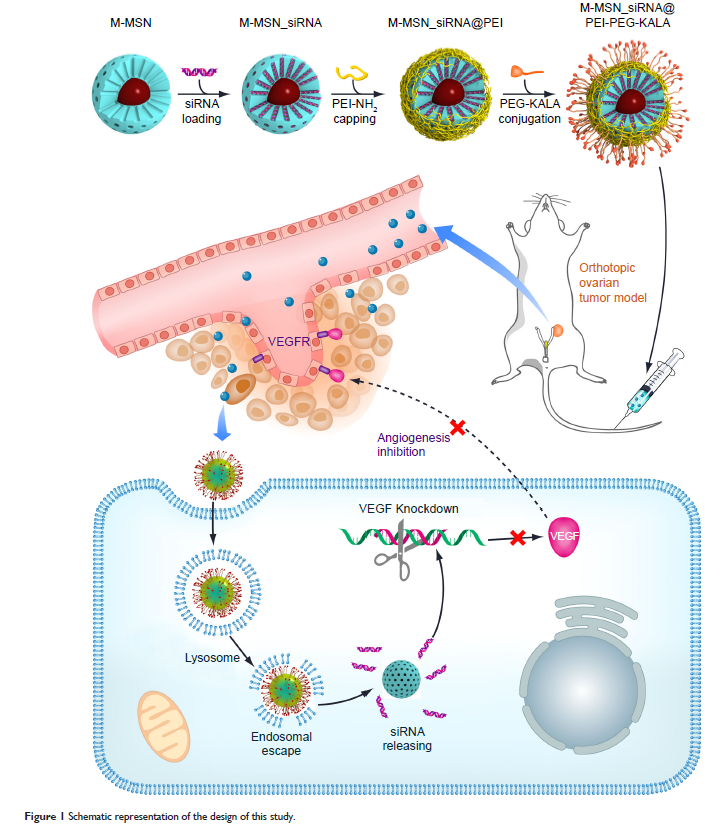9 0 6 7 6
论文已发表
注册即可获取德孚的最新动态
IF 收录期刊
- 2.6 Breast Cancer (Dove Med Press)
- 3.9 Clin Epidemiol
- 3.3 Cancer Manag Res
- 3.9 Infect Drug Resist
- 3.6 Clin Interv Aging
- 4.8 Drug Des Dev Ther
- 2.8 Int J Chronic Obstr
- 8.0 Int J Nanomed
- 2.3 Int J Women's Health
- 3.2 Neuropsych Dis Treat
- 4.0 OncoTargets Ther
- 2.2 Patient Prefer Adher
- 2.8 Ther Clin Risk Manag
- 2.7 J Pain Res
- 3.3 Diabet Metab Synd Ob
- 4.3 Psychol Res Behav Ma
- 3.4 Nat Sci Sleep
- 1.9 Pharmgenomics Pers Med
- 3.5 Risk Manag Healthc Policy
- 4.5 J Inflamm Res
- 2.3 Int J Gen Med
- 4.1 J Hepatocell Carcinoma
- 3.2 J Asthma Allergy
- 2.3 Clin Cosmet Investig Dermatol
- 3.3 J Multidiscip Healthc

通过基于磁性介孔氧化硅的 siRNA 载体对 VEGF 基因进行靶向定位导致高效抗血管生成,用于原位卵巢癌的治疗
Authors Chen Y, Wang X, Liu T, Zhang DS, Wang Y, Gu H, Di W
Published Date March 2015 Volume 2015:10 Pages 2579—2594
DOI http://dx.doi.org/10.2147/IJN.S78774
Received 5 December 2014, Accepted 23 January 2015, Published 31 March 2015
Abstract: Therapeutic
antiangiogenesis strategies have demonstrated significant antitumor efficacy in
ovarian cancer. Recently, RNA interference (RNAi) has come to be regarded as a
promising technology for treatment of disease, especially cancer. In this
study, vascular endothelial growth factor (VEGF)-small interfering RNA (siRNA)
was encapsulated into a magnetic mesoporous silica nanoparticle (M-MSN)-based,
polyethylenimine (PEI)-capped, polyethylene glycol (PEG)-grafted, fusogenic
peptide (KALA)-functionalized siRNA delivery system, termed M-MSN_VEGF
siRNA@PEI-PEG-KALA, which showed significant effectiveness with regard to VEGF
gene silencing in vitro and in vivo. The prepared siRNA delivery system readily
exhibited cellular internalization and ease of endosomal escape, resulting in
excellent RNAi efficacy without associated cytotoxicity in SKOV3 cells. In in
vivo experiments, notable retardation of tumor growth was observed in
orthotopic ovarian tumor-bearing mice, which was attributed to significant
inhibition of angiogenesis by systemic administration of this nanocarrier. No
obvious toxic drug responses were detected in major organs. Further, the magnetic
core of M-MSN_VEGF siRNA@PEI-PEG-KALA proved capable of probing the site and
size of the ovarian cancer in mice on magnetic resonance imaging. Collectively,
the results demonstrate that an M-MSN-based delivery system has potential to
serve as a carrier of siRNA therapeutics in ovarian cancer.
Keywords: antiangiogenesis,
small interfering RNA, mesoporous silica nanoparticles, vascular endothelial
growth factor, ovarian cancer
